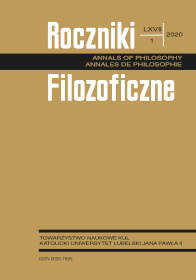The Philosopher as the Therapist: A Lesson from the Past
Abstrakt
Filozof jako terapeuta — lekcja z przeszłości
Artykuł dotyczy filozofa, który może pełnić funkcję terapeuty. W pierwszej części ukazane są tendencje do postaw terapeutycznych dostrzegane w środowisku filozofów współczesnych zaangażowanych w tzw. ulepszanie człowieka. Wykorzystując najnowsze osiągnięcia genetyki, inżynierii genetycznej i farmakologii, filozofowie ci oferują terapie ukierunkowane na „ulepszenie” ludzkiej kondycji. W drugiej części artykułu ukazane są wybrane idee dotyczące terapii filozoficznej w postaci, jaką praktykowali niektórzy filozofowie starożytni. Ich propozycje opierały się zasadniczo na kontakcie osobowym, rozmowie i radach o charakterze mądrościowym. W kolejnej części artykułu te dwa podejścia są skontrastowane i porównane. Stanowiska współczesne podkreślają wagę nowych, technicznych metod ingerencji w życie człowieka, ale są ślepe, jeśli chodzi o ujęcie istotnych celów i dóbr ludzkich. Pomimo wielu poważnych różnic kulturowych współczesna terapia może się wiele nauczyć od tej rozwijanej w starożytności. Jeśli istota ludzka ma być poddana terapii praktykowanej przez filozofa, konieczne jest wzięcie pod uwagę jej integralnego obrazu. Oznacza to, że tak jej wnętrze, również jej zewnętrzność powinny stać się przedmiotem ewentualnego oddziaływania terapeutycznego.
Bibliografia
Agar, Nicholas. Humanity’s End. Why Should We Reject Radical Enhancement. Cambridge, MA, London: The MIT Press, 2010.
Agar, Nicholas. Truly Human Enhancement. A Philosophical Defence of Limits. Cambridge, MA, London: The MIT Press, 2014.
Allhoff, Fritz, Patrick Lin, and Jesse Steinberg. “Ethics of Human Enhancement: An Executive Summary.” Science and Engineering Ethics 17 (2011): 201–212.
Annas, Julia E. “Philosophical Therapy, Ancient and Modern.” In Bioethics. Ancient Themes in Contemporary Issues, edited by Mark G. Kuczewski and Ronald Polansky, 109–127. Cambridge, MA, London: A Bradford Book of MIT Press, 2002.
Aristotle, De Anima. Translated by C.D.C. Reeve. Indianapolis: Hackett Publishing Company, 2017.
Aristotle, Protrepticus, edited by Anton-Hermann Chroust. Notre Dame: University of Notre Dame Press, 1964).
Bostrom, Nick. Savulescu, Julian. “Human Enhancement Ethics: The State of the Debate.” In Human Enhancement, edited by Julian Savulescu and Nick Bostrom, 1–22. Oxford: Oxford University Press, 2009.
Bostrom, Nick. Superintelligence. Paths, Dangers, Strategies. Oxford: Oxford University Press, 2014.
Cohen, Elliot D. Theory and Practice of Logic-based Therapy: Integrating Critical Thinking and Philosophy into Psychotherapy, Newcastle upon Tyne: Cambridge Scholars Publishing, 2013.
Delsol, Chantal. La Haine du Monde. Totalitarismes et postmodernité. Paris: Les Editions du Cerf, 2016.
Democritus. In The Older Sophists. Frag. B 31. In Julia E. Annas. “Philosophical Therapy, Ancient and Modern.” In Bioethics. Ancient Themes in Contemporary Issues, edited by Mark G. Kuczewski and Ronald Polansky. Cambridge, MA, London: A Bradford Book of MIT Press, 2002.
Frankl, Victor. Man’s Search for Meaning. An Introduction to Logotherapy, Boston, MA: Beacon Press, 2006.
Galen. “The On the Views of Hippocrates and Plato.” In Julian E. Annas. “Philosophical Therapy, Ancient and Modern.” In Bioethics. Ancient Themes in Contemporary Issues, edited by Mark G. Kuczewski and Ronald Polansky. Cambridge, MA, London: A Bradford Book of MIT Press, 2002.
Hadot, Pierre. Philosophy as a Way of Life. Spiritual Exercises from Socrates to Foucault. Translated by Michael Chase, edited by Arnold I. Davidson. Oxford: Blackwell Publishers Ltd, 1995.
Harris, John. Enhancing Evolution. The Ethical Case for Making Better People. Princeton, London: Princeton University Press, 2007.
Harris, John. How to Be Good. The Possibility of Moral Enhancement, Oxford: Oxford University Press, 2016.
Hauskeller, Michael. Better Humans? Understanding the Enhancement Project. Durham: Acumen, 2013.
Kurzweil, Ray. The Singularity Is Near: When Humans Transcend Biology. London: Penguin Books, London, 2006.
Maslow, Abraham H. Toward a Psychology of Being. Floyd, VA: Sublime Books, 2014.
Nussbaum, Martha. The Therapy of Desire. Theory and Practice in Hellenistic Ethics. Princeton, London: Princeton University Press, 1994.
Parens, Erick. “Toward a More Fruitful Debate about Enhancement.” In Human Enhancement, edited by Julian Savulescu and Nick Bostrom, 181–197. Oxford: Oxford University Press, 2009.
Persson, Igmar, and Julian Savulescu. Unfit for the Future. The Need for Moral Enhancement, Oxford: Oxford University Press, 2012.
Plato, Charmides. Translated by Thomas G. West and Grace Starry West. Indianapolis: Hackett Publishing Company, 1986.
Reale, Giovanni. Saggezza antica. Terapia per i mali dell’uomo d’oggi. Milano: Raffaelo Cortina Editore, 1995.
Sauvé Meyer, Susan. Ancient Ethics. A Critical Introduction. London. New York: Routledge, 2008.
Savulescu, Julian, Anders Sandberg, and Guy Kahane. “Well-Being and Enhancement.” In Enhancing Human Capacieties, edited by Julian Savulescu, Ruud ter Meulen, and Guy Kahane, 3–18. Malden, Oxford: Wiley-Blackwell, 2011.
Sorabji, Richard. “Body and Soul in Aristotle.” Philosophy 49 (1974), 187: 63–89.
Spaemann, Robert. Persons. The Difference between ‘Someone’ and ‘Something.’ Translated by Oliver O’Donovan. Oxford: Oxford University Press, 1996.
Copyright (c) 2020 Roczniki Filozoficzne

Utwór dostępny jest na licencji Creative Commons Uznanie autorstwa – Użycie niekomercyjne – Bez utworów zależnych 4.0 Międzynarodowe.





